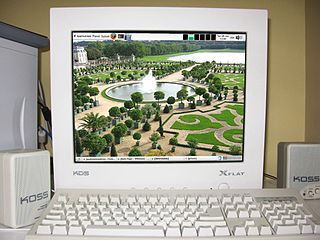The Association for Computing Machinery (ACM) is a US-based international learned society for computing. It was founded in 1947 and is the world's largest scientific and educational computing society. The ACM is a non-profit professional membership group, reporting nearly 110,000 student and professional members as of 2022. Its headquarters are in New York City.
Software engineering is an engineering approach to software development. A practitioner, a software engineer, applies the engineering design process to develop software.
An information system (IS) is a formal, sociotechnical, organizational system designed to collect, process, store, and distribute information. From a sociotechnical perspective, information systems are composed by four components: task, people, structure, and technology. Information systems can be defined as an integration of components for collection, storage and processing of data of which the data is used to provide information, contribute to knowledge as well as digital products that facilitate decision making.
Computer-supported cooperative work (CSCW) is the study of how people utilize technology collaboratively, often towards a shared goal. CSCW addresses how computer systems can support collaborative activity and coordination. More specifically, the field of CSCW seeks to analyze and draw connections between currently understood human psychological and social behaviors and available collaborative tools, or groupware. Often the goal of CSCW is to help promote and utilize technology in a collaborative way, and help create new tools to succeed in that goal. These parallels allow CSCW research to inform future design patterns or assist in the development of entirely new tools.
A special interest group (SIG) is a community within a larger organization with a shared interest in advancing a specific area of knowledge, learning or technology where members cooperate to effect or to produce solutions within their particular field, and may communicate, meet, and organize conferences. The term was used in 1961 by the Association for Computing Machinery (ACM), an academic and professional computer society. SIG was later popularized on CompuServe, an early online service provider, where SIGs were a section of the service devoted to particular interests.
The Society for Technical Communication (STC) is a professional association dedicated to the advancement of the theory and practice of technical communication with more than 4,500 members in the United States, Canada, and the world. The society publishes a quarterly journal and a magazine eight times a year and hosts an annual international conference. STC also provides online education in the form of live Web seminars, multi-week online certificate courses, virtual conferences, recorded seminars, and more.
A collaboratory, as defined by William Wulf in 1989, is a “center without walls, in which the nation’s researchers can perform their research without regard to physical location, interacting with colleagues, accessing instrumentation, sharing data and computational resources, [and] accessing information in digital libraries”.
The Australian Computer Society (ACS) is an association for information and communications technology professionals with 40,000+ members Australia-wide. According to its Constitution, its objectives are "to advance professional excellence in information technology" and "to promote the development of Australian information and communications technology resources".

UIT University is a not-for profit institute. UIT university's campus is located at the intersection of University Road and Abul Hasan Isphahani Road, Gulshan-e-Iqbal, Karachi, Pakistan.
The Special Interest Group on Computer–Human Interaction (SIGCHI) is one of the Association for Computing Machinery's special interest groups which is focused on human–computer interactions (HCI).
SIGDOC is the Special Interest Group on Design of Communication of the Association for Computing Machinery (ACM), an international learned society for computing. ACM SIGDOC was founded in 1975 by Joseph "Joe" T. Rigo.
The Canadian Association of College and University Student Services (CACUSS) is a professional association representing and serving those individuals who work in Canadian post-secondary institutions in student affairs and services. Since 1973, CACUSS has provided professional development services and programs for members in all the Canadian provinces. Cross-divisional interest groups called communities of practice and networks were formed by members in 2015 based on their professional needs, focusing on areas such as student health and wellness, first-year students, new professionals, and leadership education.

Human–computer interaction (HCI) is research in the design and the use of computer technology, which focuses on the interfaces between people (users) and computers. HCI researchers observe the ways humans interact with computers and design technologies that allow humans to interact with computers in novel ways. A device that allows interaction between human being and a computer is known as a "Human-computer Interface (HCI)".
The following outline is provided as an overview of and topical guide to software development:
Ronald Eugene Anderson, also known as Ron Anderson, was an American sociologist. He was a Professor Emeritus at University of Minnesota in Twin Cities where he taught sociology from 1968 to 2005. His early work focused on social and institutional factors shaping the diffusion of technology-based teaching. Since 2007, his work has focused on web-based compassion and world suffering.

The National Center for Women & Information Technology (NCWIT) is a 501(c)(3) nonprofit organization that works to increase participation of girls and women in computing. NCWIT was founded in 2004 by Lucinda (Lucy) Sanders, Dr. Telle Whitney, and Dr. Robert (Bobby) Schnabel. NCWIT is headquartered in Boulder, Colorado at the University of Colorado Boulder. Lucy Sanders, who was inducted into the Women in Technology International Hall of Fame in 2007, is the current chief executive officer.
Thea Drell Hodge was a member of the Association for Computing Machinery and a cofounder of the Minneapolis chapter of the Association for Women in Computing. Hodge was a pioneer for women in computer science and mentored many women in the field.
The Penny Crane Award for Distinguished Service is an award issued by the Association for Computing Machinery's Special Interest Group on University and College Computing Services. It was established in 2000 to recognise individuals who have made significant contributions to the Special Interest Group, and to computing in higher education.

ACM SIGAI is the Association for Computing Machinery's Special Interest Group on Artificial Intelligence (AI), an interdisciplinary group of academic and industrial researchers, practitioners, software developers, end users, and students who work together to promote and support the growth and application of AI principles and techniques throughout computing. SIGAI is one of the oldest special interest groups in the ACM. SIGAI, previously called SIGART, started in 1966, publishing the SIGART Newsletter that later became the SIGART Bulletin and Intelligence Magazine.

Simon Rogerson is lifetime Professor Emeritus in Computer Ethics at the Centre for Computing and Social Responsibility (CCSR), De Montfort University. He was the founder and editor for 19 volumes of the Journal of Information, Communication and Ethics in Society. He has had two careers; first as a technical software developer and then in academia as reformer. He was the founding Director of CCSR, launching it in 1995 at the first ETHICOMP conference which he conceived and co-directed until 2013. He became Europe's first Professor in Computer Ethics in 1998. His most important research focuses on providing rigorously grounded practical tools and guidance to computing practitioners. For his leadership and research achievements in the computer and information ethics interdisciplinary field he was awarded the fifth IFIP-WG9.2 Namur Award in 2000 and the SIGCAS Making a Difference Award in 2005.





